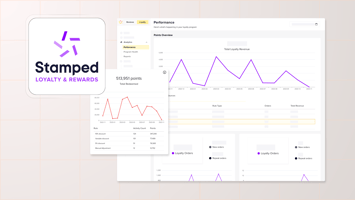Comparing Review Platforms: Who Does It Best? (2023)
Whether they’re looking to buy the perfect swimsuit, moisturizer, or protein powder, almost every single customer does the exact same thing: look at product reviews. Customers rely heavily on reviews to learn about the product, develop trust in the brand, and make a purchase decision. Without reviews, potential customers are almost guaranteed to shop elsewhere. In short - brands that don’t have easily accessible reviews are missing out.
If brands want to build customer relationships and drive conversions, they need to collect and showcase reviews. More than half of customers read at least four or more reviews before they buy something, while 60% of customers think that the number of reviews a brand has is critical when choosing between competing businesses.
Additionally, product pages that feature reviews result in 3.5 times more conversions and 4.5 times more Revenue Per Visitor (RPV) than those without. Lastly, brands that use reviews to improve their products can drive even more conversions: 84% of brands that adjust their strategies based on customer feedback report notable increases in revenue.
In today’s highly saturated ecommerce landscape, skeptical customers are more likely to ignore competing marketing campaigns and trust other people’s reviews and recommendations instead. Reviews are crucial for converting potential buyers into new customers and eventually, into brand advocates.
Whether you’re looking to launch a new reviews strategy or improve your existing one, there are several platforms available to choose from. Each option has its own advantages and disadvantages - which one works best for your brand?
Comparing customer reviews solutions
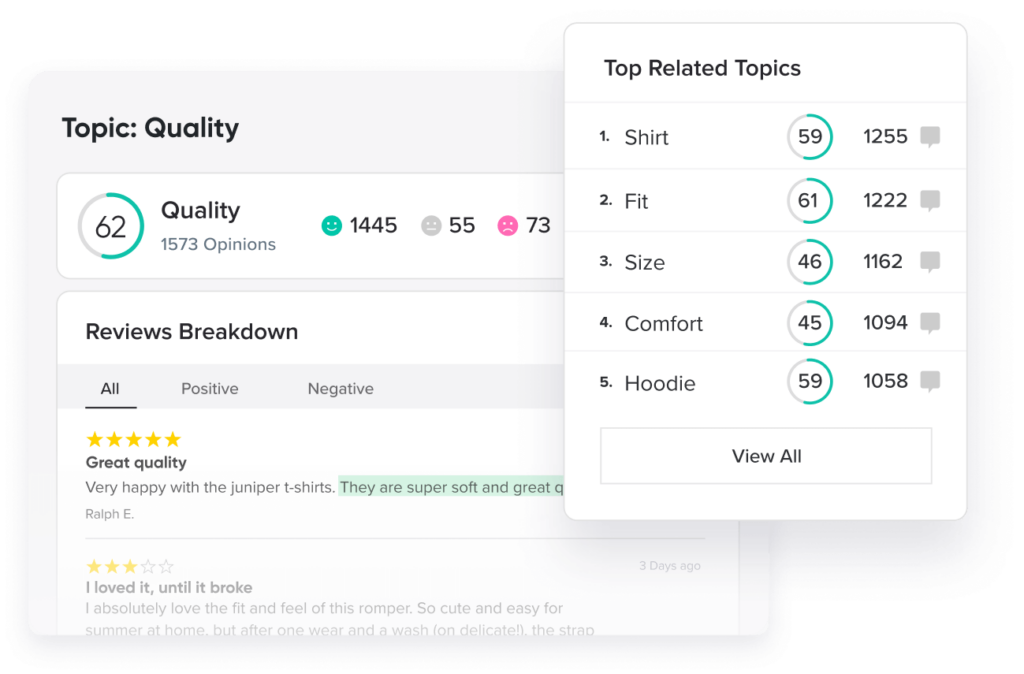
Stamped
Stamped, founded in 2016, offers solutions for reviews and ratings, loyalty and rewards, referrals, net promoter scores (NPS), user-generated content, and data-driven insights. Stamped’s mission is to “help ecommerce brands of all sizes grow their businesses through genuine relationships with their customers.” Stamped currently serves over 75,000 ecommerce brands, including Inno Supps, Tentree, and Frankies Bikinis.
Customer Profile
While Stamped helps brands of all sizes accelerate their business growth, it’s best suited for mid-market and enterprise brands based on the available features and pricing plans. This includes the Full Suite option for brands looking to combine reviews and loyalty, and the Enterprise pricing plan with custom rates and a dedicated customer success manager. Stamped also has over one hundred agency partners available to help mid-market brands who don’t have a dedicated developer. Most of Stamped’s customers are in the health, wellness, beauty, apparel, and fitness industries, though we also work with home and garden, food, and sports brands as well.
Features
Overview
Stamped offers two products: Loyalty and Reviews. Loyalty maximizes engagement and customer lifetime value, while Reviews gain insights and drive increased conversions, both on-site and through other marketing channels like email, search, and social media. Both products can be leveraged together to help merchants “establish brand credibility and accelerate business growth”.
With Stamped Reviews, brands can collect and showcase product and site reviews to boost conversions and uncover actionable insights. They can gather, moderate, and analyze reviews, highlight reviews on dedicated landing pages, product pages, site widgets, and Google search results, and leverage reviews to boost SEO rankings and enrich marketing content. Lastly, brands can curate user-generated content, conduct NPS surveys, and contextualize reviews for smarter business decisions and accelerated business growth.
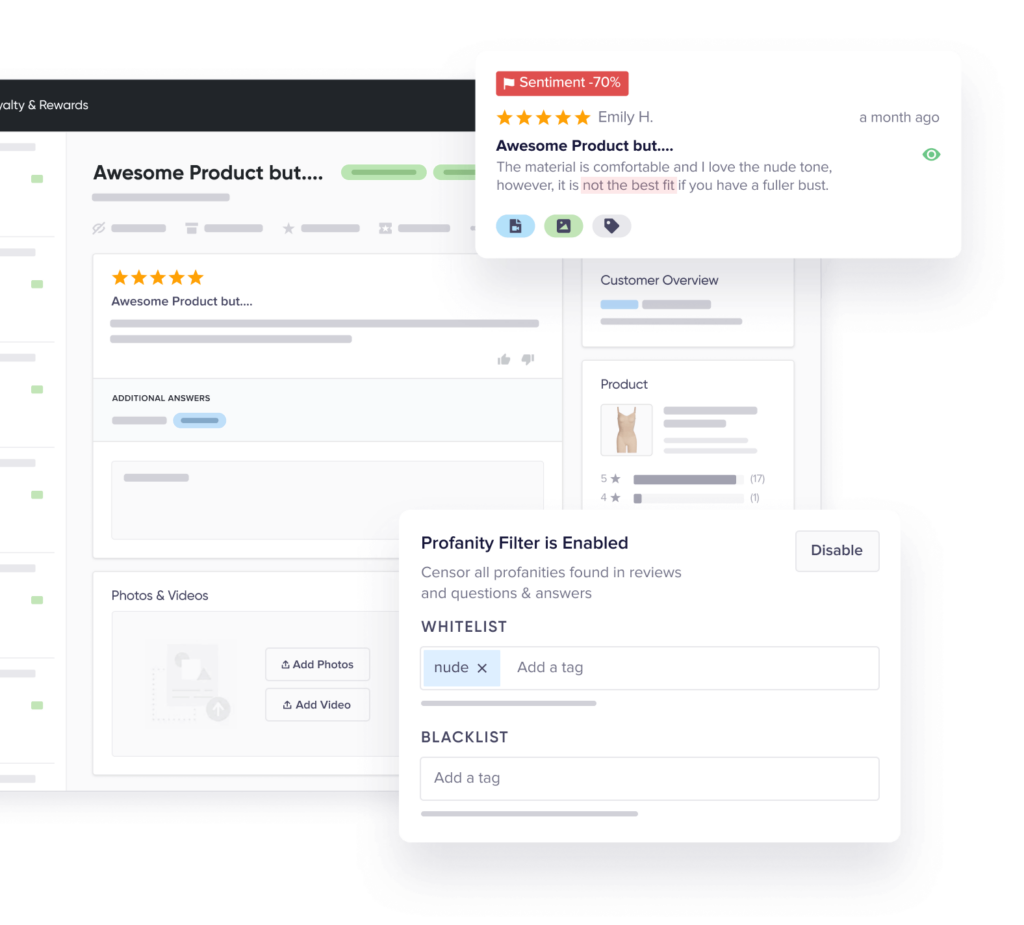
Brands send review requests via email and SMS, where customers directly submit their reviews using the in-email form without needing to navigate to another landing page or website. Brands can also include custom forms to ask more specific questions and get a better understanding of their customers. They can use StampedIQ’s Smart Assist feature to help customers write higher-quality reviews. Brands can use Checkout Reviews and Community Q&A to ask and answer customer questions. Site visitors can also sort and browse reviews by topic filters, star ratings, and search terms. Lastly, brands can incentivize and reward customers for writing reviews by sending coupon codes, leading to increased chances of conversion.
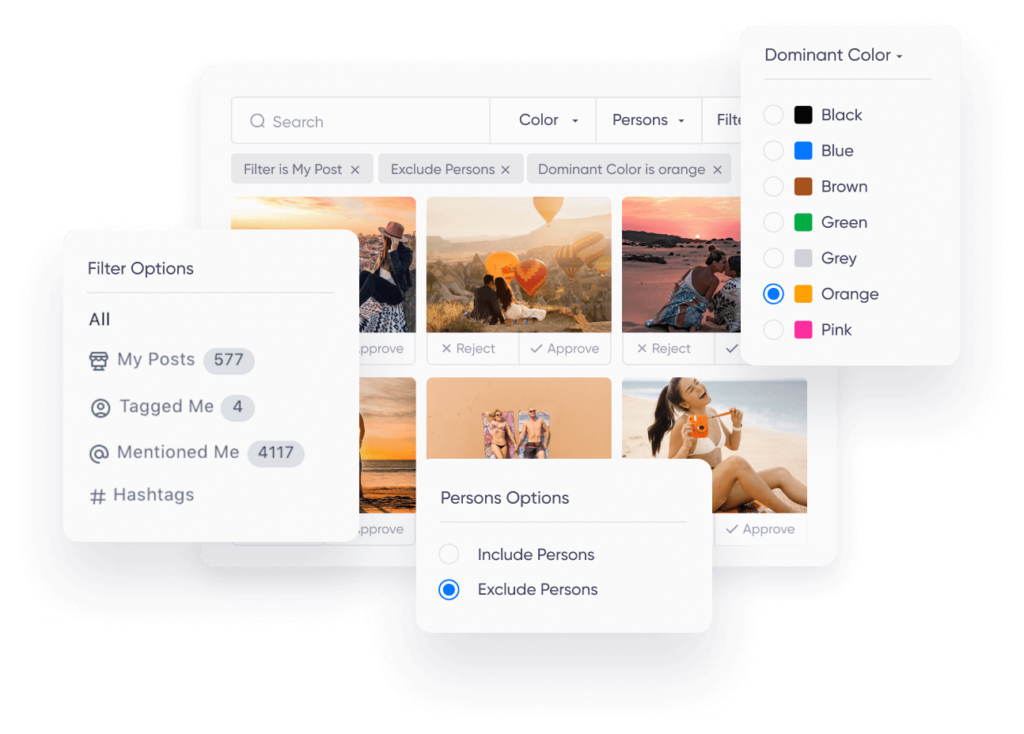
Stamped’s user-generated content feature helps brands collect, moderate, and organize photos and videos obtained from reviews. Brands can filter media by color, quality, and objects, group media into albums to create visual showcases, design social and retargeting ads, and create shoppable Instagram galleries. These media-centric features help brands stand out from their competitors and boost their on-site conversions.
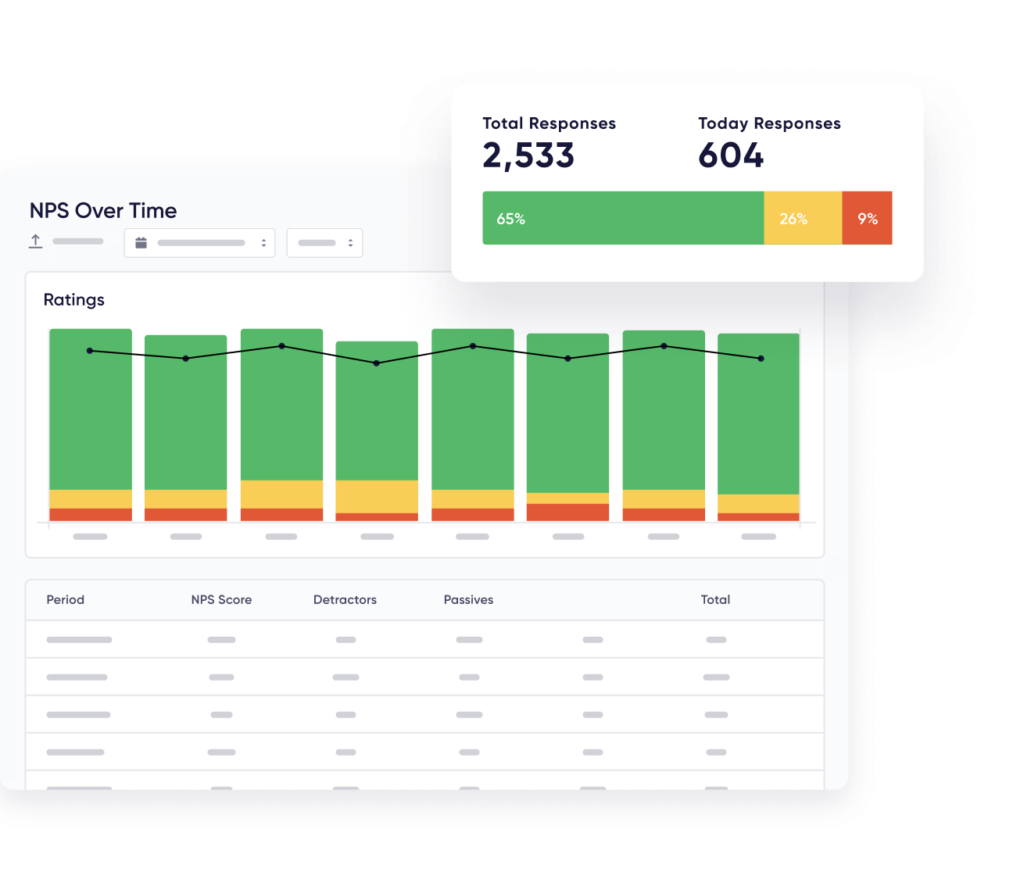
Next, Stamped’s net promoter score (NPS) feature helps brands measure customer happiness and monitor the percentage of detractors, passives, and promoters respectively. Brands send survey requests via email, website, SMS, and direct links, where customers provide a rating on a scale of 0 to 10 and provide context for their rating. Brands can identify recurring trends and topics to discover what’s working and what needs to be improved.
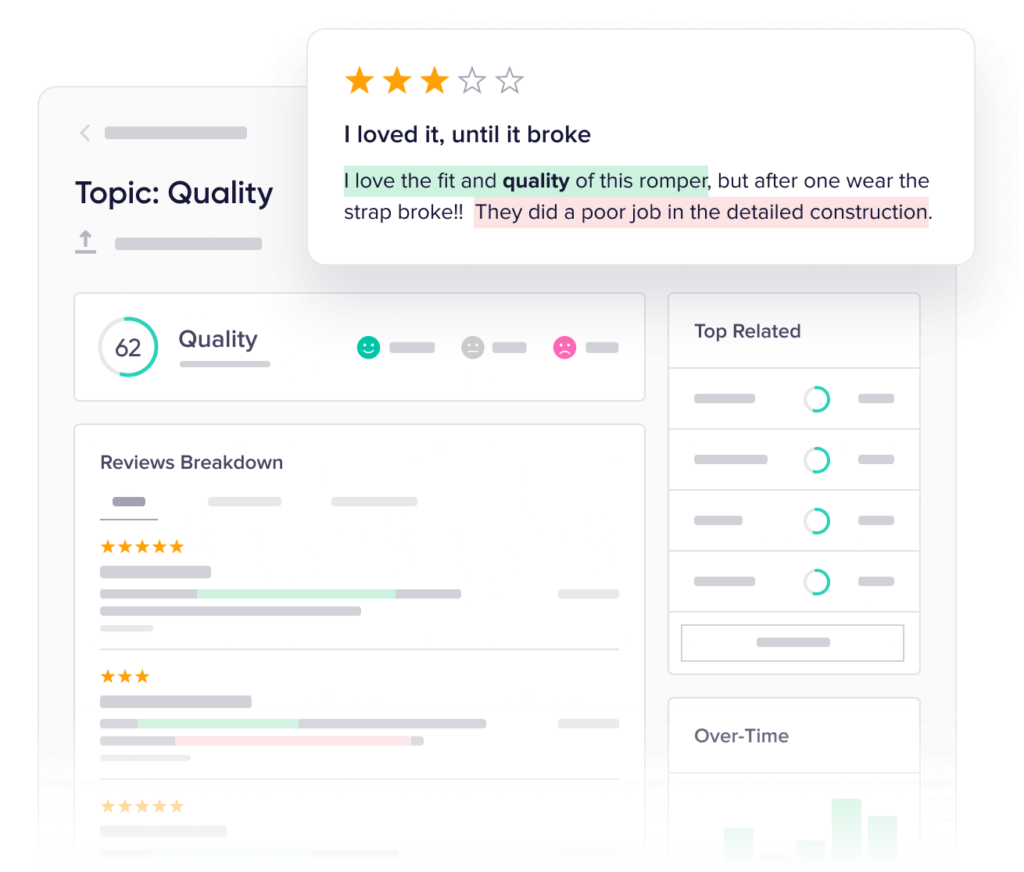
Lastly, StampedIQ leverages artificial intelligence and machine learning to produce actionable insights at scale. In addition to Smart Assist, brands can use Sentiment and Topics Analysis to improve shopper review accuracy, prevent them from posting false positive reviews, convert reviews into contextual overviews, and make adjustments based on customer sentiment. StampedIQ also helps brands curate their visual content and manage UGC for landing pages, product pages, and social media. All of these tools make reviews easy for customers to write and easy for brands to moderate, curate, and leverage.
Platforms & Integrations
Stamped works with Shopify and Shopify Plus, BigCommerce, and WooCommerce. It can also be implemented on a headless platform or a custom/generic ecommerce platform like Wix and Shoplazza with HTML. Lastly, brands can easily import their existing reviews into Stamped with a CSV file and request reviews for past orders to improve their review conversion rates.
Stamped offers multiple integrations with tools that brands already know and love for marketing automations, syndication, email and SMS marketing, social commerce, payment management, and more. This includes Google, Facebook and Instagram, Attentive, Gorgias, Klaviyo, Rebuy, Tapcart, and KnoCommerce.
⚙️ Check out the full list of integrations in our Stamped Integrations Directory.
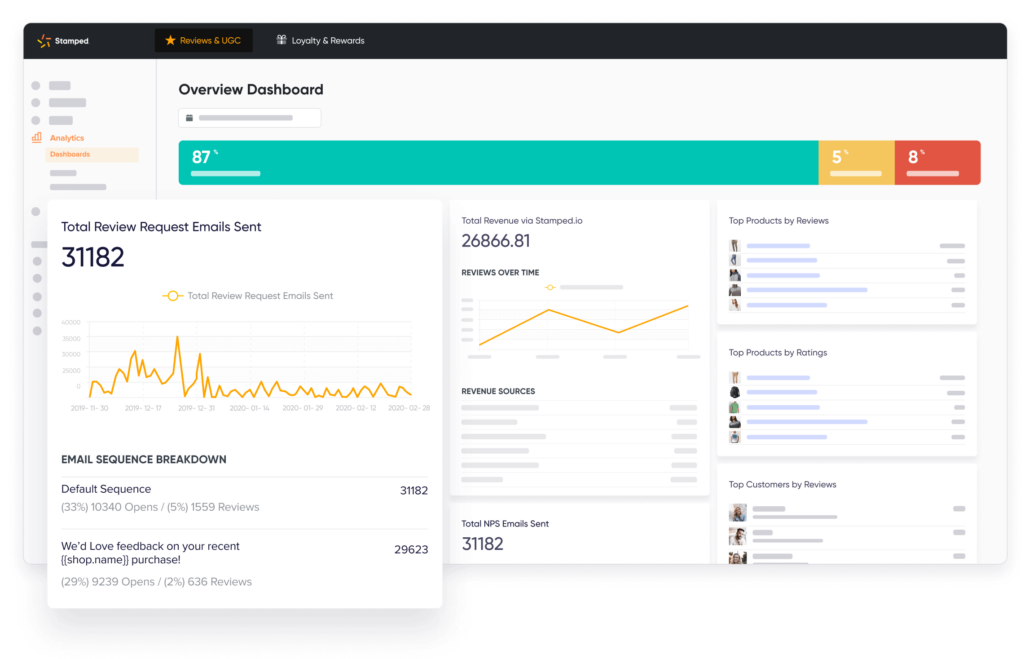
Data & Analytics
Brands also get access to powerful customer insights in the Reviews dashboard. They can identify top customers and products by reviews, top keywords and searches, total review request emails sent, and more. These data points help brands learn more about their customers and inform their strategies for driving engagement, conversions, repeat purchases, and customer retention. Stamped customers on a full-suite plan can also view their reviews and loyalty data in one place.
Learn more about the value of customer insights and best practices for collecting them.
Pricing Plans
Stamped currently offers six different pricing plans:
- Free: $0/month, up to 50 monthly review requests and 1 integration; includes in-email and SMS review requests, customizable review fields
- Basic: $23/month billed monthly or $19/month billed annually, up to 200 monthly review requests and 1 integration; includes free features + photo reviews, checkout reviews, and $39 in free SMS credits
- Premium: $59/month billed monthly or $49/month billed annually, up to 500 monthly review requests and 3 integrations; includes basic features + CSS customization, visual gallery, and Smart Product Recommendations
- Business: $149/month billed monthly or $119/month billed annually, up to 1500 monthly review requests and 5 integrations; includes premium features + Google Product Ratings, video reviews, community Q&A, and ESP integrations
- Professional: $299/month billed monthly or $249/month billed annually, up to 3500 monthly review requests and unlimited integrations; includes business features + NPS surveys, Google Seller Ratings, and shoppable Instagram galleries
- Enterprise: custom rate and custom monthly review requests; includes professional features + API access, a dedicated Onboarding & Customer Success Manager, and ongoing customization support
Stamped customers get up to a 20% discount on any plan paid annually. They also have a full-suite option that combines Reviews and Loyalty so they can manage their reviews and loyalty strategies in one place. Full-suite pricing plans start at $279/month billed monthly or $229/month billed annually.
Pros and Cons
Stamped’s Reviews solution offers features similar to other platforms like Yotpo, Junip, and Okendo. However, Stamped provides more value for brands looking to acquire new customers and boost conversions in several ways.
To start, Stamped’s fair and transparent pricing structure makes it easy for brands to get a clear sense of which plan best suits their budget and needs. Compared to other competitors, brands don’t need to pay for the most expensive plan to get access to the features they need. For example, Yotpo customers need to pay a custom rate to get CSS customization, while Stamped customers only need to pay $59/month (Yotpo’s Premium plan vs. Stamped’s Premium plan). Brands can also subscribe to Stamped on a month-to-month basis without needing to commit to a long-term contract. Most other reviews platforms do not offer the flexibility of monthly and annual pricing plans.
Stamped has world-class onboarding and support teams to help brands create, manage, and optimize their reviews strategy, as well as ongoing communication for product fixes, updates, and so on. It also offers a contract buyout option, making it easy for brands to switch platforms without paying excessive fees or significantly impacting their customers.
Feature-wise, Stamped customers can easily customize several aspects of their landing page, widgets, and emails without needing a dedicated developer. There are also multiple display widgets available to help brands highlight their product and site reviews in different areas of their website, making it easier for customers to make a purchase decision. Stamped can syndicate reviews across multiple websites, domains, locations, countries, and more, as well as push reviews to Google Shopping Ads, search engines, and social media.
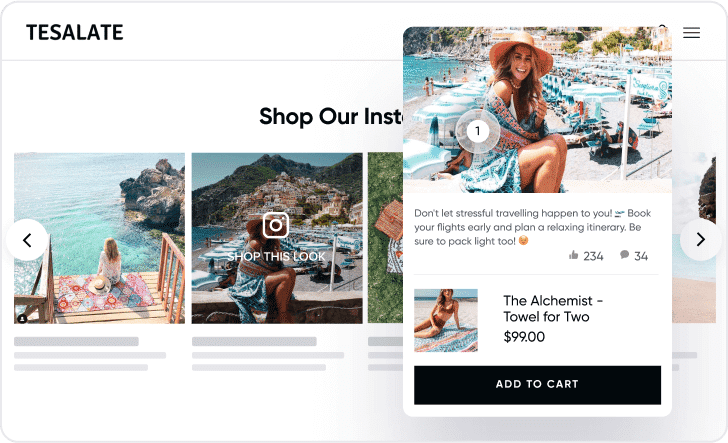
Stamped customers also have access to features that aren’t widely available on other reviews platforms. For example, while platforms like Yotpo have a custom forms feature and Okendo has its Okendo Surveys product, Stamped Reviews includes a built-in NPS feature where brands can collect reviews and customer satisfaction scores at the same time, making it simple to measure customer happiness and view actionable feedback in one place. Stamped’s shoppable Instagram galleries are another unique and highly useful feature. Most reviews platforms only offer a social push option to Facebook and/or Meta syndication, but with shoppable Instagram galleries, brands can drive more social engagement and more sales where customers can make purchases without needing to leave their website. Finally, Stamped’s smart social banners help brands turn reviews into compelling visual content and high-performing ads. These banners are easy to create, automate, and publish without needing a dedicated designer or marketer, and can be used to drive more engagement and sales.
Lastly, Stamped Reviews customers can take full advantage of the Full Suite option to leverage Loyalty as well. Together, both products drive more sales, engagement, retention, and new business. For example, brands can ask customers to write a review in exchange for reward points, resulting in increased trust from potential customers and increased loyalty from existing ones. Loyalty also increases customer retention and lifetime value, and gives brands more opportunities to drive sales and engagement with both new and existing customers.
Learn more about Loyalty to get the most out of your Stamped experience.
The main disadvantage of Stamped is that it only offers Reviews and Loyalty, which might not appeal to brands looking for platforms with other products like subscription services and SMS marketing. However, Stamped’s integration and agency partners guarantee that brands get all the features and assistance they’re looking for without needing to lock themselves into a single ecosystem. Brands don’t need to compromise to provide a well-rounded experience for their customers or struggle to connect their new loyalty program to their existing tech stack. Stamped is focused on delivering the best possible Reviews and Loyalty experience, from customer onboarding to product features to ongoing support. Stamped’s team of knowledgeable, customer-driven experts ensures that brands get a quality reviews solution and achieve their business goals.
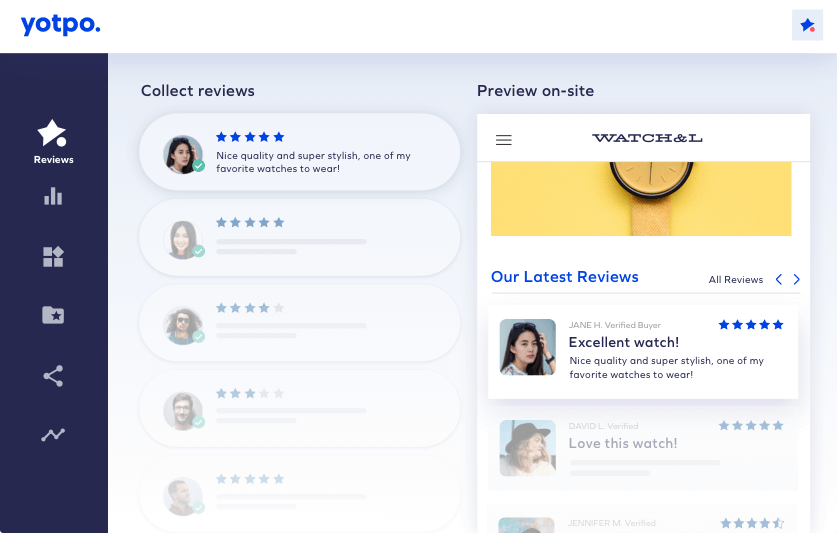
Yotpo
Yotpo was founded in 2011 by Tomer Tagrin and Omri Cohen. It offers solutions for reviews, SMS marketing, loyalty and referrals, subscriptions, and visual user-generated content. Yotpo’s mission is to “provide brands with everything they need to create winning customer experiences, from discovery to purchase.” Yotpo currently serves over 30,000 ecommerce brands, including GoPro, Steve Madden, and Muji.
Customer Profile
Yotpo is best suited for enterprise-level brands that aren’t price-conscious, as its one-to-one customer support and advanced customization features are only available for those on their Premium and Enterprise plans. Yotpo customers also need to be able to afford their own developers and build their own strategies due to Yotpo’s support limitations. Most of Yotpo’s customers are in the apparel, beauty, and wellness market, though they also work with brands in the home and garden, fitness, and food industries as well.
Note: Onboarding management is only available to Prime customers and up, while Customer Success Managers are limited to Premium and Enterprise accounts only.
Features
Overview
Yotpo offers five different products: Reviews, Loyalty & Referrals, SMSBump, Subscriptions, and Visual UGC. They’re designed to work together so brands can “create customer advocates, engage at the right time, and motivate loyal customers.”
With Yotpo’s Reviews, brands can collect and display customer reviews on their website. They can ask custom questions, curate photos and videos, and use community Q&A to answer customers’ questions. Brands can incentivize and reward customers for writing reviews by sending coupon codes. Site visitors can also sort and browse reviews by topic filters and star ratings. Lastly, brands can share their reviews on social media and through Google Shopping Ads, Google Seller Ratings, and rich snippets.
Note: Custom questions, topic filters, community Q&A, and team management are limited to Prime accounts and up. Smart filters, advanced CSS, and multi-store management are only available for Premium and Enterprise customers.
Platforms & Integrations
Yotpo works with Shopify and Shopify Plus, Salesforce Commerce Cloud, Magento, BigCommerce, and WooCommerce. It can also be implemented on a headless platform or a custom/generic ecommerce platform using Yotpo’s Core API.
Yotpo offers multiple integrations with tools for marketing automations, email marketing, influencer marketing, subscription management, and CRM management. This includes HubSpot, Mailchimp, Klaviyo, Gorgias, Omnisend, and Emarsys.
Note: Helpdesk integrations and integrations via API and webhooks are available for Premium and Enterprise accounts only.
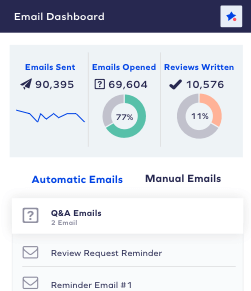
Data & Analytics
Brands also get access to reviews, photos, conversions, and email analytics dashboards. This helps them learn more about their customers and measure and optimize their performance over time.
Note: Reporting templates and advanced consumer insights are limited to Prime customers and up. AI-powered features like review tagging and smart filters, which help brands sort reviews and identify common review topics, are available for Premium and Enterprise accounts only.
Additionally, if brands want to connect their Reviews data with data from other Yotpo products, they likely need to upgrade to a more expensive plan. For example, SMSBump’s Custom Analytics & Reports feature is limited to Enterprise accounts only at a custom rate.
Pricing Plans
Yotpo currently offers five different pricing plans:
- Free: $0/month, up to 50 monthly review requests; includes automatic review requests, email templates, review moderation, and 24/7 live chat support
- Growth: starts at $15/month and 50 monthly review requests; includes free features + Google Rich Snippets, photo and video reviews, coupon incentives, and the ability to share reviews to Facebook Shops and Google Shopping Ads
- Prime: starts at $119/month and 250 monthly review requests; includes growth features + Google Seller Ratings, shoppable galleries, product and shopper attributes, community Q&A, and onboarding support
- Premium: custom rate and custom monthly review requests; includes prime features + smart AI and analytics, CSS customization, multiple users and domains, and a dedicated customer success manager
- Enterprise: custom rate and custom monthly review requests; includes premium features + project management and scoping, dedicated security and compliance, enterprise customer success manager, and priority access to professional services
Premium and Enterprise accounts require a custom quote and are directly tied to features, usage, and contract negotiation. Pricing plans are also limited to annual contracts only regardless of whether brands pay on a monthly or annual basis, which are set to auto-renew, and annual prices increase with each renewal. Yotpo customers can bundle Reviews with other products like Loyalty & Referrals and SMSBump at a custom rate.
Pros and Cons
The main benefit of Yotpo Reviews is the ability to bundle it with Yotpo’s other products, making it easier for brands to manage customer journeys in one place. However, this can also be a challenge for brands looking to add Yotpo to their existing tech stack, as Yotpo’s solutions are designed to work together in a single ecosystem. Yotpo’s other products can also translate to a lack of flexibility, where brands might not find the functionality they’re looking for. Specifically, Yotpo does not offer some of the most popular integrations because they directly compete with the products they offer. For example, Yotpo doesn’t have an Attentive integration as it conflicts with SMSBump, making it difficult for brands already using Attentive.
Yotpo also lacks transparency and flexibility in terms of pricing. To start, some of Yotpo’s plans require a demo before receiving a custom quote and all plans require an annual agreement, making it difficult for brands to commit or switch platforms if needed. Smaller brands may also struggle to get the support needed to run a successful reviews strategy, as Yotpo’s dedicated one-to-one customer support is only available for Premium and Enterprise accounts.
Feature-wise, Yotpo also limits some of its most valuable functions to its most expensive pricing plans. For example, CSS customization and smart analytics are available for Premium and Enterprise customers only. It also lacks a dedicated NPS feature, which can be disadvantageous for brands looking to get deeper insights into customer sentiment. Lastly, its Visual UGC product is separate from its Reviews product, meaning brands need to pay for both to take full advantage of customers’ photo and video reviews. Both the separation of Yotpo products and the lack of popular integrations impact the quality of Yotpo Reviews as a stand-alone reviews solution.
By comparison, Stamped allows brands to easily integrate with the tools they already use and offers transparent pricing with either a monthly subscription or annual contract, preventing brands from feeling locked in. It also has dedicated onboarding and support teams to ensure business growth and success. Stamped’s dedicated NPS feature makes it easy for brands of all sizes to learn more about their customers, and CSS customization is available at a much more accessible price. Lastly, Stamped Reviews includes a visual UGC component, where brands don’t need to pay extra to leverage customers’ photos and videos in their marketing strategies and advertising campaigns.
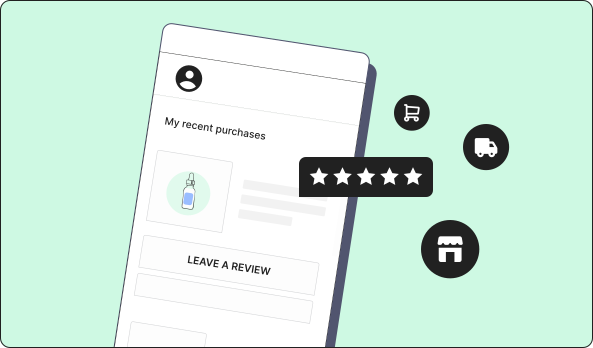
Junip
Junip was founded in 2020 by Clayton Passmore, Robin Sharma, and Stuart Arsenault. It offers solutions for reviews and ratings, including UGC and Google shopping syndication. Junip’s mission is to help brands “meet customers when and where it’s easiest for them to review.” Junip currently serves over 3,000 brands, including Pier 1 Imports, Manduka, and DressBarn.
Customer Profile
Junip is best suited for SMBs (small and midsize businesses) and mid-market brands based on its pricing plan and current customer base. The majority of Junip’s customers are in the food and beverage, beauty, fitness, and health and wellness industries.
Note: Only Pro and Enterprise customers get access to a dedicated launch manager during the onboarding process and additional support.
Features
Overview
Junip offers a reviews and ratings solution aimed at helping brands collect and showcase reviews to drive new business and more sales. Its goal is to help brands “easily leverage reviews everywhere that matters.”
In addition to the ability to collect and showcase reviews, Junip also offers six major features: photos & videos, custom questions & traits, reply, feature, & flag, media galleries, API, and syndication between storefronts. Brands can collect reviews via mobile and desktop, create progressive submission forms, reward customers with coupon codes, customize their product and reviews landing pages, and syndicate reviews to Google Shopping, Ads, and so on.
Note: Custom HTML emails and regional syndication are limited to Pro customers only.
Platforms & Integrations
Junip works with Shopify and Shopify Plus. It can also be implemented on a headless platform or a custom/generic ecommerce platform using HTML. Junip offers multiple integrations with tools for marketing automations, displays and links, and delivery and order tracking. This includes Klaviyo, Attentive, Omnisend, Rebuy, KnoCommerce, and AfterShip.
Note: Junip does not work with ecommerce platforms like BigCommerce and WooCommerce.

Data & Analytics
Junip offers very limited information about its reviews data and analytics dashboard. The dashboard helps brands track basic information like their review averages, the total number of reviews submitted, and review request metrics like deliveries, opens, clicks, bounces, and spam reports.
Pricing Plans
Junip currently offers five different pricing plans:
- Free: $0/month, up to 50 monthly review requests
- Essentials: starts at $19/month and 500 monthly review requests, up to 2 users; includes photo and video reviews, Google review snippets, email and chat support, and API access
- Standard: starts at $74/month and 2000 monthly review requests, up to 4 users; includes essentials features + Google shopping syndication, marketing integrations, custom questions, featured reviews, and product traits and grouping
- Pro: starts at $299/month and 10,000 monthly review requests, up to 10 users; includes standard features + custom HTML emails, regional syndication, and launch manager and support
- Enterprise: custom rate for stores with over 150,000 monthly review requests and more than 5 storefronts
Junip does not offer any discounts and/or annual pricing plans. Prices are subject to the number of monthly review requests, i.e. Essentials ranges from $19/month to $59/month, Standard ranges from $74/month to $224/month, and Pro ranges from $299/month to $1499/month.
Pros and Cons
Junip offers similar features compared to other reviews platforms, including custom forms, review syndication, and coupon incentives. It’s also primarily designed and optimized for mobile users, which can be advantageous for brands as customers often shop and look at reviews on their phones. However, Junip is lacking in several key areas, especially in terms of clarity on pricing, features, analytics, and customer support.
To start, it doesn’t have a native loyalty application, and combining Junip with another loyalty platform is likely to result in significantly higher costs than solutions like Stamped’s Full Suite. It also has very limited information on pricing plan features, as there is no dedicated comparison table and no clear explanation of what’s included in its free plan. Junip doesn’t offer a yearly pricing option for brands looking for an annual discount. Lastly, its dedicated onboarding support is limited to Pro and Enterprise brands only, which can make it difficult for smaller brands setting up their reviews strategy for the first time.
Junip is only available for Shopify and Shopify Plus customers, excluding brands who use other ecommerce platforms like BigCommerce or WooCommerce. It also limits the number of users based on pricing plan, which can be frustrating for brands trying to manage and moderate their reviews. Lastly, Junip offers a limited set of integrations, with only a handful of options for marketing automation, review displays, and order tracking. It does not offer helpdesk or loyalty integrations, meaning brands can’t leverage reviews in their loyalty program or vice versa.
Features-wise, Junip’s custom emails and regional syndication are limited to Pro and Enterprise customers only, meaning brands on cheaper pricing plans have fewer options for personalized communications and review distribution. It also has next to no information about its analytics features and its current dashboard only provides very basic data points. Junip can only display reviews on a dedicated landing page or product pages, with no options for additional widgets like side drawers, carousels, and badges. Lastly, Junip lacks a few common reviews features like community Q&A, NPS ratings, and visual UGC galleries.
By comparison, Stamped offers a Full Suite solution where customers can leverage reviews and loyalty together at a reasonable rate. Stamped also has fair pricing plans and a clear comparison chart where brands can easily determine which plan works best for their budget and needs. Stamped’s pricing plans are highly flexible with both a monthly and yearly option, where annual plans come with a 20% discount. Lastly, Stamped has dedicated onboarding and support teams to ensure business growth and success.
Compared to Junip, Stamped not only works with Shopify and Shopify Plus but with BigCommerce and WooCommerce as well. Stamped customers do not have a user limitation and also have access to a wide variety of integrations with tools they already know and use, making it easy for them to add Stamped to their existing tech stack. This includes helpdesk integrations like Gorgias and Zendesk, as well as popular integrations Junip doesn’t currently offer, such as Tapcart, Recharge, and Gatsby.
With Stamped, customers can customize their emails at a significantly lower cost (Stamped’s Business plan at $179/month versus Junip’s Pro plan at $299/month) and get access to in-depth insights. Compared to Junip’s basic analytics dashboard, StampedIQ is especially powerful for data-driven optimization, helping brands improve review accuracy and collect quality feedback. Stamped also offers a wide range of review widgets like carousels and badges so brands can help customers make purchase decisions no matter where they are on their website. Lastly, Stamped Reviews includes built-in Q&A, NPS, and UGC features to help brands answer customers’ questions, gain actionable insights, and leverage visual content.
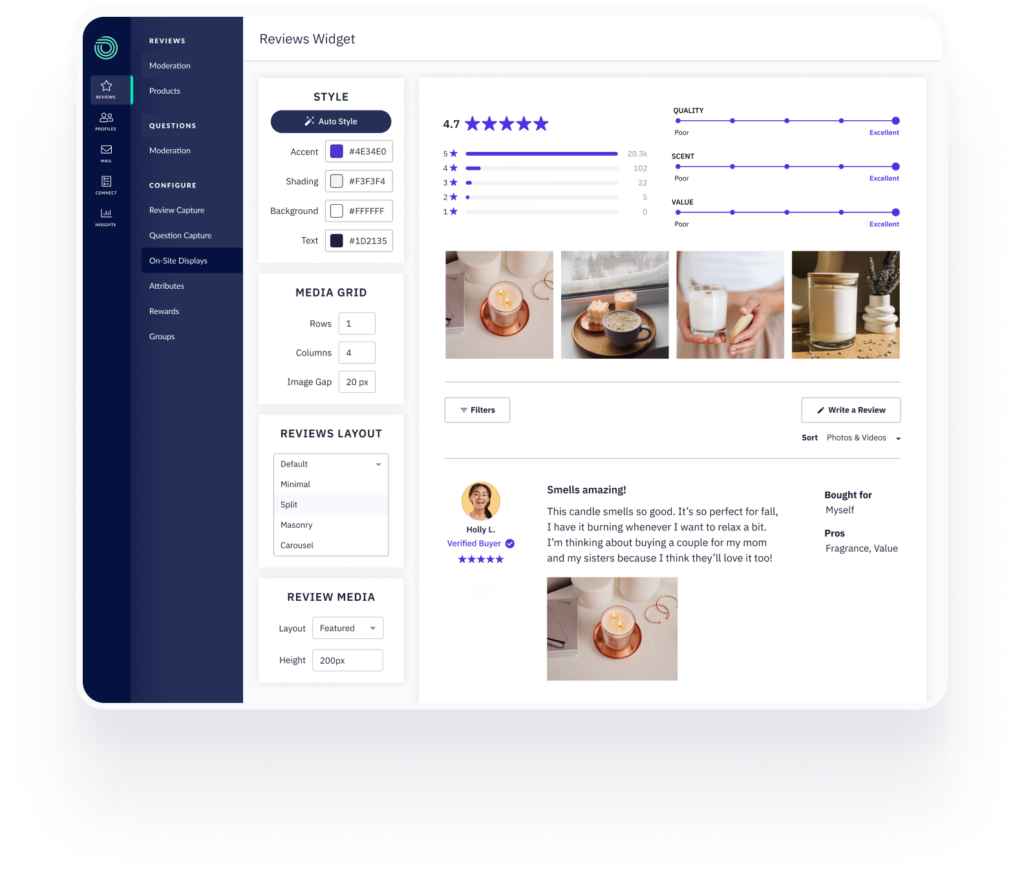
Okendo
Okendo was founded in 2018 by Matt Garven and Matthew Goodman. It offers two solutions, Okendo Reviews and Okendo Surveys, to help brands build trust and gain actionable insights. Okendo’s mission is to “help ecommerce brands build stronger customer relationships.” Okendo currently serves over 7,000 brands, including Soylent, Skims, and Crunchyroll.
Customer Profile
Okendo is best suited for upper-mid-market businesses and enterprise brands. Most of Okendo’s customers are in the apparel, beauty, and food and beverage industries.
Note: Onboarding specialists are available for Power customers and up. Only Advanced accounts get a dedicated customer success manager, while only Enterprise accounts get a key account manager and solution engineering.
Features
Overview
Okendo offers two different products: Okendo Reviews and Okendo Surveys. Okendo Reviews helps brands “build trust, showcase community, and drive more conversions”, while Okendo Surveys helps brands “collect actionable insights into customer preferences, behaviors, and experiences”. Brands can bundle Okendo Reviews and Okendo Surveys together at a discounted price.
With Okendo Reviews, brands can collect and showcase customer reviews. Okendo specifically highlights four key areas: the ability to generate high-velocity content, convert more browsers into buyers, supercharge marketing programs, and manage customer content at scale. Features include photo and video reviews, attribute ratings, onsite displays, retail syndication, content moderation, coupon codes, and reporting & analytics.
Note: Targeted review requests and custom CSS are for Power customers and up. White-label branding, Walmart and Bazaarvoice syndication, and API access are only available for Advanced and Enterprise accounts. Lastly, Google Seller Ratings and custom display widgets are for Enterprise accounts only.
Platforms & Integrations
Okendo works with Shopify and Shopify Plus. It can also be implemented on a headless platform or a custom/generic ecommerce platform using HTML or Okendo’s REST API. Okendo offers multiple integrations with tools for marketing automations, email marketing, and customer support. This includes Klaviyo, Attentive, Gorgias, Rebuy, Klarna, and AfterShip.
Note: Okendo does not work with ecommerce platforms like BigCommerce and WooCommerce. Headless support is limited to Advanced and Enterprise users only. Lastly, integration categories are locked to specific pricing plans. For example, SMS and email integrations are limited to Power accounts and up, while custom integrations are limited to Enterprise customers only.
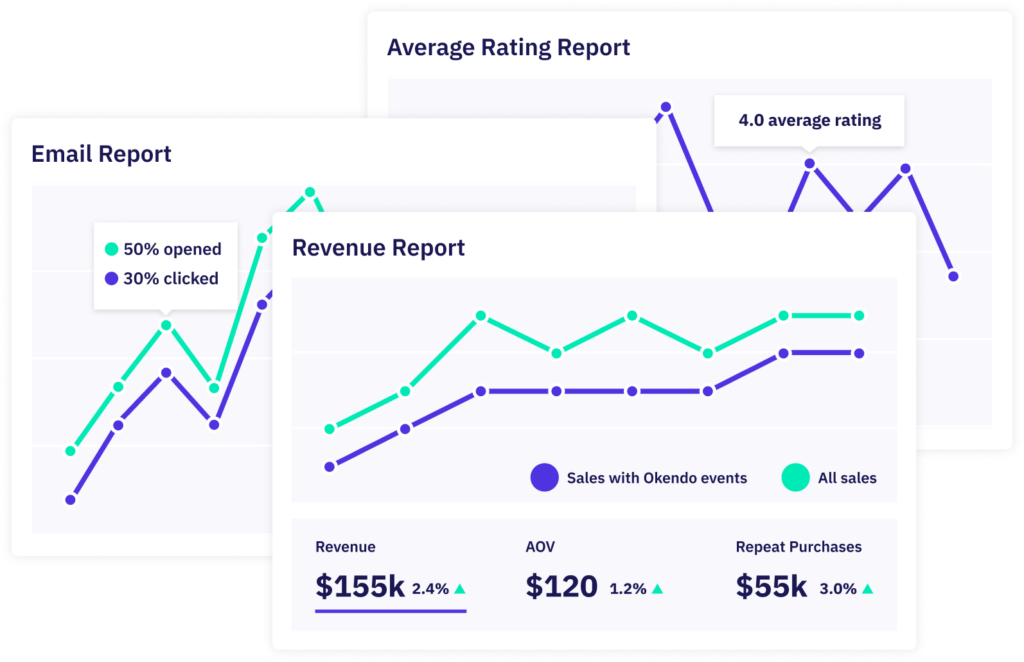
Data & Analytics
Brands also get access to an analytics dashboard, which includes customer profiles and reporting functionality. With customer profiles, brands can manage and respond to feedback at the individual customer level. Reporting and analytics help brands gain actionable insights and measure the impact of reviews on their bottom line. Okendo Survey customers also get access to survey-related insights like impressions, response rates, and drop-off rates.
Note: Advanced report filters are limited to Power accounts and up, while custom reporting is available for Enterprise customers only.
Pricing Plans
Okendo currently offers five different pricing plans:
- Essentials: $19/month, includes photo and video reviews, review moderation, analytics and reports, sentiment analysis, social sharing, and Google Rich Snippets
- Growth: $119/month, up to 1500 monthly review requests; includes essentials features + white-labeled widgets, attribute filters, community Q&A, Google Shopping Integration, Meta Shops Syndication, and help desk integrations
- Power: $299/month, up to 3500 monthly review requests; includes growth features + multi-store syndication, email and SMS integrations, advanced reporting, and an onboarding manager
- Advanced: $499/month, up to 10,000 monthly review requests; includes power features + headless support, Bazaarvoice syndication, API access, and a customer success manager
- Enterprise: custom rate and custom monthly review requests; includes advanced features + custom reporting, custom integrations, custom SLAs, and a key account manager
Customers can bundle Okendo Reviews with Okendo Surveys to receive 10% savings with three different pricing plans: Power at $385/month and up to 3500 monthly review requests, Advanced at $673/month and up to 10,000 monthly review requests, or Enterprise at a custom rate and a custom number of monthly review requests.
Pros and Cons
Okendo offers similar features compared to other reviews platforms, including custom forms, community Q&A, and review syndication. Okendo users can also bundle Reviews and Surveys to ask customers more specific questions and gain relevant insights. Okendo has a variety of widget options similar to Stamped’s, including review carousels and badges. Lastly, Okendo offers detailed reporting and analytics to help brands measure the impact of reviews and the performance of their reviews strategy. However, Okendo is lacking in a few key areas in terms of support and features.
To start, it doesn’t have a native loyalty application, and combining Okendo with another loyalty platform is likely to result in significantly higher costs than solutions like Stamped’s Full Suite. Only Advanced accounts get a customer success manager and only Enterprise accounts get a key account manager and solution engineering, which can make it difficult for smaller brands setting up their reviews strategy for the first time.
Okendo is only available for Shopify and Shopify Plus customers, excluding brands who use other ecommerce platforms like BigCommerce or WooCommerce. Some features like white-label branding and API access are for Advanced and Enterprise customers only, while custom reporting is only available to Enterprise users. These limitations can negatively affect smaller brands’ ability to customize and leverage their reviews strategy to fit their needs. Lastly, Okendo Reviews does not include a built-in NPS feature or post-purchase/post-review surveys. Brands need to bundle Reviews with Okendo Surveys to get access to these features.
By comparison, Stamped offers a Full Suite solution where customers can leverage reviews and loyalty together at a reasonable rate. Stamped also has dedicated onboarding and support teams to ensure business growth and success.
Compared to Okendo, Stamped not only works with Shopify and Shopify Plus but with BigCommerce and WooCommerce as well. Stamped customers also get access to helpdesk and ESP integrations at a significantly lower cost (Stamped’s Premium plan at $59/month versus Okendo’s Growth plan at $119/month and Stamped’s Business plan at $149/month versus Okendo’s Power plan at $299/month, respectively).
Lastly, Stamped’s built-in NPS feature makes it easy for brands to measure customer happiness and optimize their marketing strategies. Stamped also offers a Checkout Reviews feature where brands can ask questions directly after customers complete a purchase, which is available starting with Stamped’s Basic plan at $19/month (compared to Okendo’s Reviews and Surveys bundle where customers can send post-purchase surveys, which starts at $428/month).
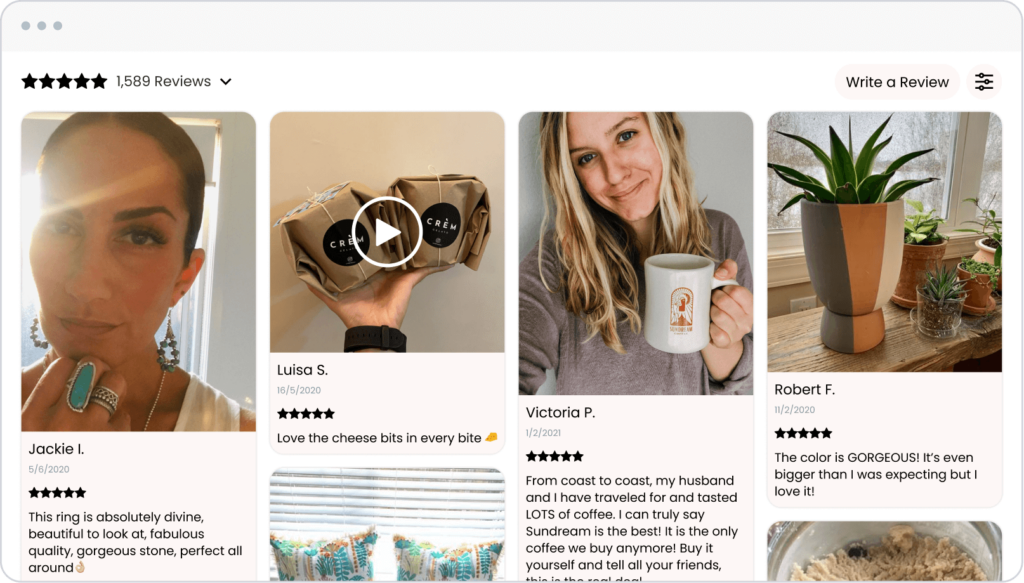
Loox
Loox was founded in 2015 by Moran Benisty and Yoni Elbaz. It offers two solutions, Product Reviews and Customer Referrals, to help brands boost credibility and drive new business. Loox’s mission is to help brands “turn real customers into ambassadors that submit visual reviews, share product experiences, and refer friends.” Loox currently serves over 100,000 brands, including UGG, Lamborghini, and Urban Dictionary.
Customer Profile
Loox is best suited for SMBs (small and midsize businesses) with relatively small monthly order volumes. The majority of Loox’s customers are in the beauty, apparel, technology, home, and fitness industries.
Note: Loox does not seem to offer dedicated onboarding or one-to-one customer support, as customers can only contact them via chat and email. Only Unlimited users get access to priority support.
Features
Overview
Loox offers two different products: Product Reviews and Customer Referrals. Product Reviews help brands “boost credibility and sales with social proof”, while Customer Referrals help “encourage customers to promote your brand”. Brands can either get Product Reviews as a stand-alone product or bundle Product Reviews and Customer Referrals together.
With Loox’s Product Reviews, brands can “capture customers’ attention across the buyer journey” by collecting and showcasing reviews on product pages, homepage carousels, and dedicated landing pages. They also have pop-up, sidebar, and cart display widgets to facilitate easy review access. Lastly, Loox customers can reward customers for writing reviews by sending coupon codes, and can boost review visibility on social media and Google Shopping.
Note: Brands can only reward customers who include photos in their reviews.
Platforms & Integrations
Loox works with Shopify and Shopify Plus. It can also be implemented on a headless platform or a custom/generic ecommerce platform using HTML. Loox offers multiple integrations with tools for marketing automations, page builders, and search results. This includes Klaviyo, Omnisend, PageFly, AfterShip, and Searchanise.
Note: Loox does not work with ecommerce platforms like BigCommerce and WooCommerce. It also lacks several popular integrations for review syndication, email and SMS marketing, helpdesks, and so on, including Bazaarvoice, Attentive, and Gorgias. Lastly, some integrations are only fully functional on the most expensive plan. For example, Growth customers can use Klaviyo and Omnisend to set up review triggers, but only Unlimited customers can set up review request flows.
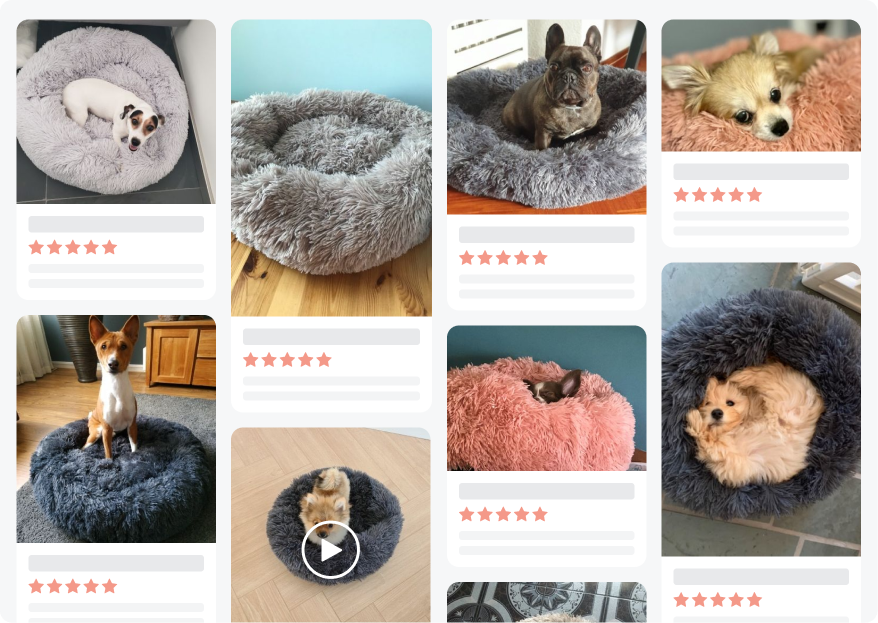
Data & Analytics
Loox automatically pushes customer engagement data into brands’ Google Analytics accounts when integrated with their Shopify account. This includes widget interactions like clicks and star ratings.
Note: Loox does not seem to offer its own analytics dashboard or data insights outside of its Google Analytics integration.
Pricing Plans
Loox currently offers three different pricing plans:
- Beginner: $9.99/month, up to 500 monthly review requests and 100 automatic review requests; includes review request emails, discounts for photo reviews, and multilingual support
- Growth: $34.99/month, unlimited monthly review requests and pay-as-you-go automatic review requests (300 requests + $35 per additional 300 emails); includes beginner features + video reviews, full customization, Google Shopping integration, and white labeling
- Unlimited: $599.99/month, unlimited monthly review requests and unlimited automatic review requests; includes growth features + unlimited referrals, full Klaviyo integration, and priority support
Loox does not offer any discounts and/or annual pricing plans. Customers can add referrals to their plan at an increased cost: Beginner at $14.99/month with up to 100 monthly referral orders, Growth at $39.99/month with 300 to 6000 monthly referral orders, and Unlimited at $599.99/month with an unlimited number of monthly referral orders.
Pros and Cons
Loox offers similar features compared to other reviews platforms, including custom forms and a wide variety of display widgets. Its cart display widget in particular shows product reviews right at checkout, which helps customers make a final purchase decision. Loox users can also bundle Reviews and Referrals to drive new business and increase chances of conversion. However, Loox is also lacking compared to other platforms in terms of support, integrations, and key features.
To start, it doesn’t have a native loyalty application, and combining Loox with another loyalty platform is likely to result in significantly higher costs than solutions like Stamped’s Full Suite. Loox users can’t get Loox’s Referrals solution on its own, meaning they may end up paying for features they don’t plan to use. Loox also doesn’t offer a yearly pricing option for brands looking for an annual discount, and the price difference between its Growth and Unlimited plan is steep, especially for brands looking to scale their business and gain access to more features ($34.99/month versus $599.99/month). Loox also has three specific limits between pricing plans: total orders, automatic review requests, and total upsell revenue, which may be confusing and/or frustrating for brands. Loox doesn’t appear to offer one-to-one onboarding or customer support, as customers can only contact them via chat and email, and only Unlimited users get access to priority support.
Loox is only available for Shopify and Shopify Plus customers, excluding brands who use other ecommerce platforms like BigCommerce or WooCommerce. As mentioned previously, it also lacks several popular integrations for review syndication, email marketing, helpdesks, and so on, including Bazaarvoice, Attentive, and Gorgias, making it more difficult for brands to add Loox to their existing tech stack. Lastly, some integrations are only fully functional on the most expensive plan. For example, Growth customers can use Klaviyo and Omnisend to set up review triggers, but only Unlimited customers can set up review request flows.
Feature-wise, Loox is also lacking in several different ways. To start, Loox does not offer review syndication outside of Meta (i.e. Facebook and Instagram shops) and Google Shopping, meaning brands can’t push reviews across multiple domains or to major retail websites like Walmart and Target. Loox users can only reward customers for writing reviews with photos, meaning they can’t incentivize other types of reviews. Custom forms are limited to multiple-choice questions only, so brands can’t ask customers to write their own answers. While brands can reply directly to customer reviews, there is no community Q&A feature where customers can ask questions for the brand or other customers to respond to. Lastly, there is no built-in NPS feature to measure customer satisfaction.
By comparison, Stamped offers a Full Suite solution where customers can leverage reviews and loyalty together at a reasonable rate. Stamped’s pricing plans are also highly flexible with both a monthly and yearly option, where annual plans come with a 20% discount. Stamped customers only have to be mindful of their order limit when choosing the best plan and do not have to worry about total upsell revenue. Finally, Stamped has dedicated onboarding and support teams to ensure business growth and success, including customer success managers who work with brands on a one-to-one basis.
Compared to Loox, Stamped not only works with Shopify and Shopify Plus but with BigCommerce and WooCommerce as well. Stamped users get access to a wide variety of integrations they already know and use, including Bazaarvoice, Attentive, Gorgias, Tapcart, and Zendesk. They also pay significantly less to get full access to integrations like Klaviyo and Omnisend (Stamped’s Business plan at $149/month versus Loox’s Unlimited plan at $599.99/month).
Stamped offers review syndication made easy, helping brands distribute reviews across multiple websites, domains, locations, countries, and more. Stamped users can also reward customers for different types of reviews, not just photo reviews, and can ask customers different types of questions in custom forms, not just multiple-choice. Community Q&A gives customers the opportunity to ask questions that other customers or the brand itself can answer, giving them more confidence in making a purchase decision. Lastly, Stamped’s built-in NPS feature makes it easy for brands to measure customer happiness and optimize their marketing strategies based on actionable feedback.
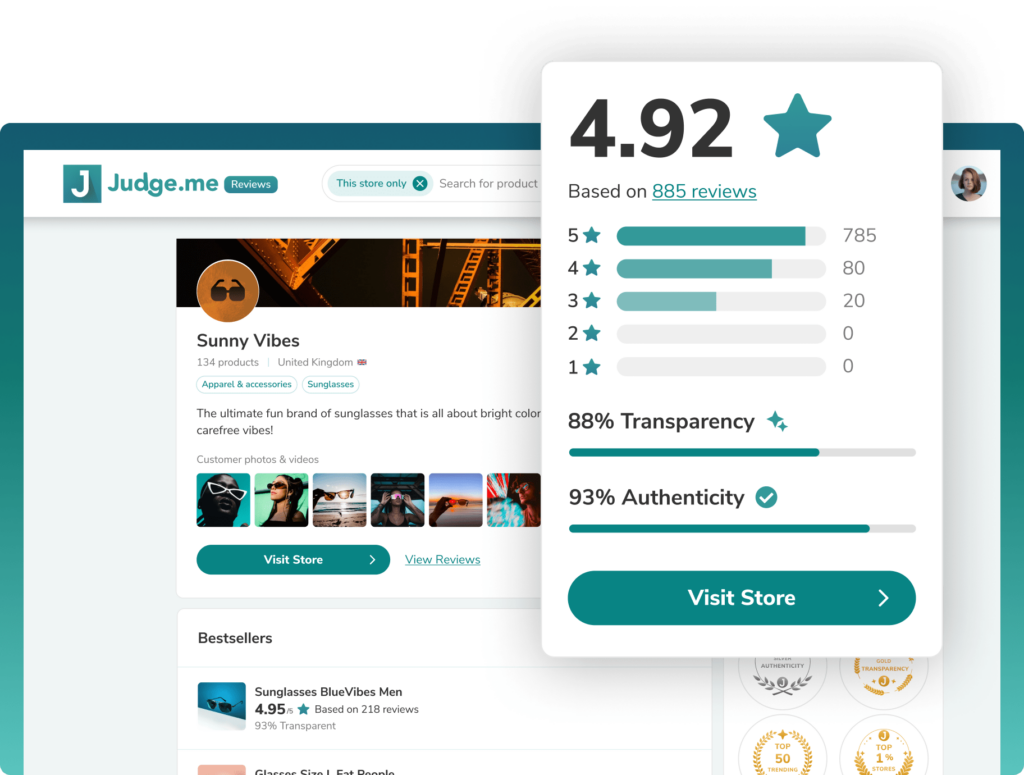
Judge.me
Judge.me was founded in 2015 by Peter-Jan Celis. It offers three solutions, Product Reviews, AliExpress Reviews, and Checkout Comments to help brands build social proof and improve conversion rates. Judge.me’s mission is to “help online stores build trust.” Judge.me currently serves over 250,000 brands, including Headphone Zone, Protectly, and Vikle Liv.
Customer Profile
Judge.me is best suited for is best suited for SMBs (small and midsize businesses) with relatively small monthly order volumes. Most of Judge.me’s customers are in the home, apparel, food and beverage, and health and wellness industries.
Note: Judge.me offers basic onboarding for installation and importing reviews, but does not seem to offer one-to-one customer support, as customers can only contact them via email or its discussion forum.
Features
Overview
Judge.me offers three different products: Product Reviews, AliExpress Reviews, and Checkout Comments. Product Reviews help brands “collect and display product and store reviews”, AliExpress Reviews help them “import product reviews easily from AliExpress”, and Checkout Comments help them “ask customers 'what do you like about this product?' on the checkout page following a purchase”. AliExpress Reviews and Checkout Comments are free, while Product Reviews cost up to $15/month.
For Product Reviews, Judge.me highlights four main features: the ability to install and customize widgets, to collect more reviews automatically, to manage reviews, and to share reviews across multiple channels. Brands can collect reviews via email, SMS, and push notifications, reward customers for writing reviews with coupon codes, curate and moderate review content, showcase reviews in different types of widgets and on dedicated landing pages, and share reviews on Facebook and Google Shopping.
Note: Features like email and widget customization, a dedicated reviews landing page, community Q&A, product grouping, reward coupons, and automated reminders are limited to the Awesome plan.
Platforms & Integrations
Judge.me works with Shopify and Shopify Plus, Squarespace, PrestaShop, BigCommerce, and WooCommerce. It can also be implemented on a headless platform or a custom/generic ecommerce platform using HTML.
Judge.me offers multiple integrations with tools for marketing automations, email marketing, page builders, and push notifications. This includes Klaviyo, Gorgias, Zapier, Omnisend, PageFly, and PushOwl.
Note: Most popular integrations are limited to the Awesome plan, including Klaviyo, Gorgias, and Zapier.
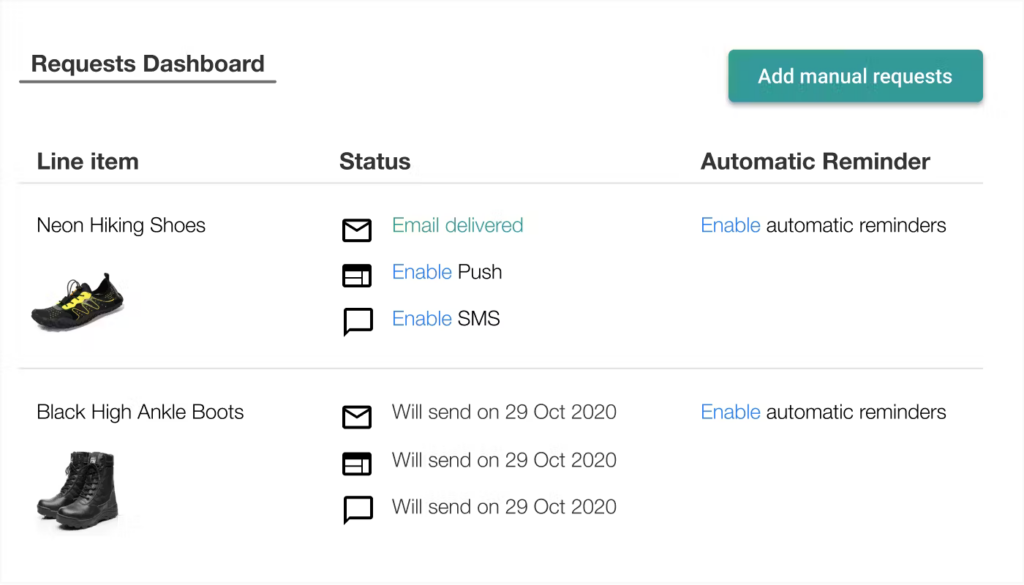
Data & Analytics
Brands also get access to a dedicated Reports tab, where they get actionable insights about their product reviews. This includes reviews received and request emails sent, transparency score (percentage of published verified reviews in the total verified reviews received) and authenticity score (percentage of verified reviews in the total reviews published), and email conversion rates. This data helps brands get a better understanding of the effectiveness of their reviews strategy.
Pricing Plans
Judge.me currently offers two different pricing plans:
- Forever Free: $0/month, unlimited monthly review requests; includes photo and video reviews, SEO rich snippets, review moderation, and review importing
- Awesome: $15/month, unlimited monthly review requests; includes free features + drag-and-drop email editor, full customization, automatic reminders, reward coupons, custom Q&A, Facebook Social Push, and Google Shopping integration
Judge.me does not offer any discounts and/or annual pricing plans.
Pros and Cons
Judge.me offers similar features compared to other reviews platforms, including custom forms, community Q&A, and coupon incentives. It’s also the cheapest reviews platform option, with a decent set of features in its free plan. Judge.me brands can also collect reviews via push notifications, increasing chances of conversion. However, Judge.me is lacking in a couple of key areas, including customer support and feature depth.
To start, it doesn’t have a native loyalty application, and combining Judge.me with another loyalty platform is likely to result in significantly higher costs than solutions like Stamped’s Full Suite. Judge.me also doesn’t offer a yearly pricing option for brands looking for an annual discount. As mentioned previously, Judge.me does not seem to offer one-to-one customer support, as customers can only contact them via email or its discussion forum.
Features-wise, Judge.me does not offer review syndication outside of Google Shopping and social push (i.e. Facebook, Instagram, and Twitter), meaning brands can’t share reviews across multiple websites or to major retail websites like Walmart and Target. There is no built-in NPS feature to measure customer satisfaction, and brands can’t create review filters to help customers look for specific topics before making a purchase decision. It only offers basic customization options for pushing reviews to social media and does not give brands a way to filter and curate customers’ photos and videos. Lastly, its analytics dashboard does not provide any insights into common review topics or keywords.
By comparison, Stamped offers a Full Suite solution where customers can leverage reviews and loyalty together at a reasonable rate. Stamped’s pricing plans are also highly flexible with both a monthly and yearly option, where annual plans come with a 20% discount. Finally, Stamped has dedicated onboarding and support teams to ensure business growth and success, including customer success managers who work with brands on a one-to-one basis.
Stamped also offers review syndication made easy, helping brands distribute reviews across multiple websites, domains, locations, countries, and more. Stamped’s built-in NPS feature makes it easy for brands to measure customer happiness and optimize their marketing strategies based on actionable feedback. Stamped users also get access to features like topic filters, smart social banners, shoppable Instagram galleries, and media albums to make the most of customer reviews and drive more sales and engagement. Lastly, Stamped’s analytics dashboard provides in-depth, actionable insights to help brands better understand and serve their customers, including top customers and products by reviews, top keywords and searches, and more. Compared to Judge.me’s basic analytics, StampedIQ is especially powerful for data-driven optimization, helping brands improve review accuracy and collect quality feedback.
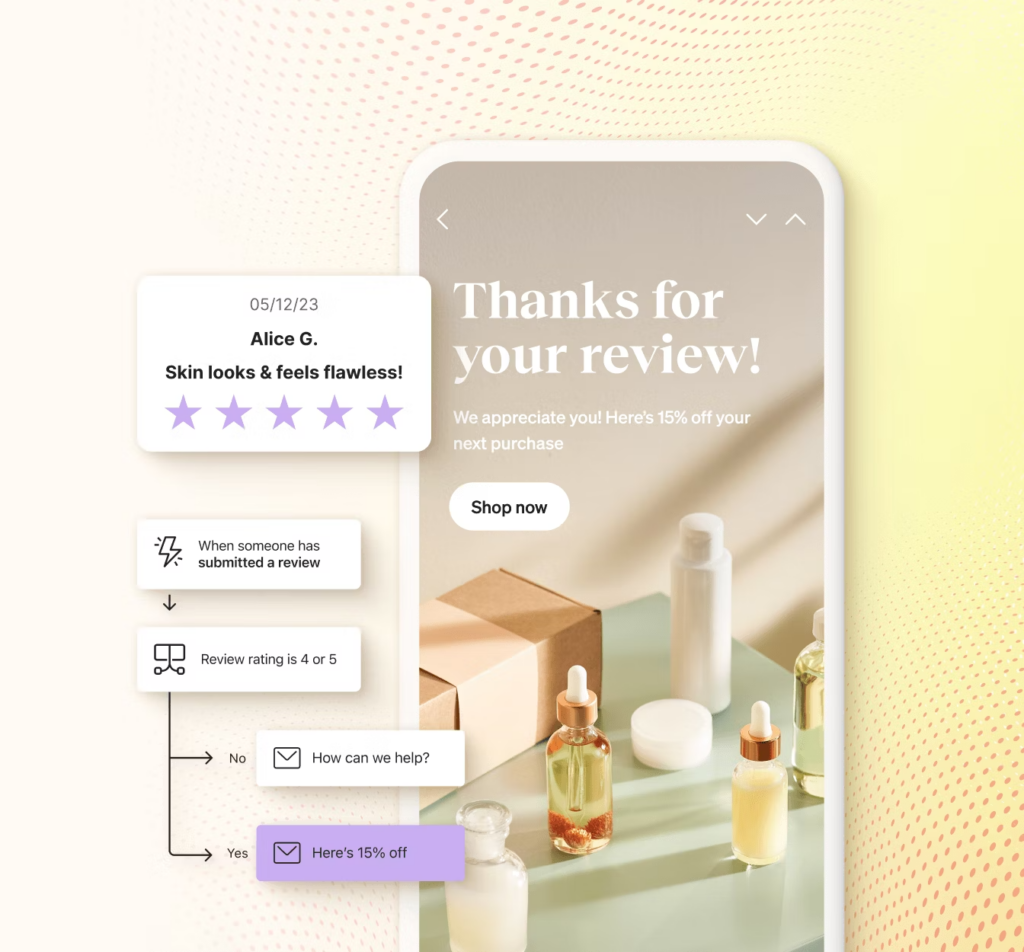
Klaviyo
Klaviyo was founded in 2012 by Andrew Bialecki and Ed Hallen. It offers solutions for reviews, email marketing, SMS marketing, and push notifications. Klaviyo’s mission is to help brands “turn all of your customer data into hyper-personalized messages that shoppers want.” Klaviyo currently serves over 100,000 ecommerce brands, including Glossier, Nuun, and Bloom Nutrition.
Customer Profile
Klaviyo is best suited for mid-market businesses and enterprise brands. The majority of Klaviyo’s customers are in the apparel, beauty, food and beverage, and health and wellness industries.
Note: As Klaviyo Reviews is a brand-new product, the onboarding process and support structure is currently unknown.
Features
Overview
Klaviyo offers four different products: Email, SMS, Mobile Push, and Reviews. They’re intended to work together so brands can “create, measure, and optimize any combination of email, SMS, and mobile push messages” and “get the most out of [their] product reviews with [their] data consolidated in one platform”.
With Klaviyo’s Reviews, brands can collect reviews and customer data, display and manage their product reviews, and give shoppers the confidence they need to make a purchase. They can send automated review requests, gather insights from custom questions, design on-brand experiences, segment users based on review data, and build trust with verified reviews.
Note: Klaviyo Reviews currently does not have the ability to collect video reviews.
Platforms & Integrations
Klaviyo Reviews works with Shopify and Shopify Plus. Klaviyo also offers multiple integrations with tools for helpdesks, loyalty and referral programs, affiliate and influencer marketing, and so on, including Gorgias, Gatsby, Rebuy, Zapier, and Stamped.
Note: Klaviyo Reviews does not work with most ecommerce platforms that are available for other Klaviyo products, including BigCommerce, WooCommerce, Wix, and Square Online. It also can’t be implemented on a headless platform or a custom/generic ecommerce platform. Klaviyo also lacks several popular integrations that compete directly with other Klaviyo products, including Hubspot, Attentive, Mailchimp, and Omnisend. Lastly, Klaviyo does not offer review syndication with popular tools like Bazaarvoice and Meta.
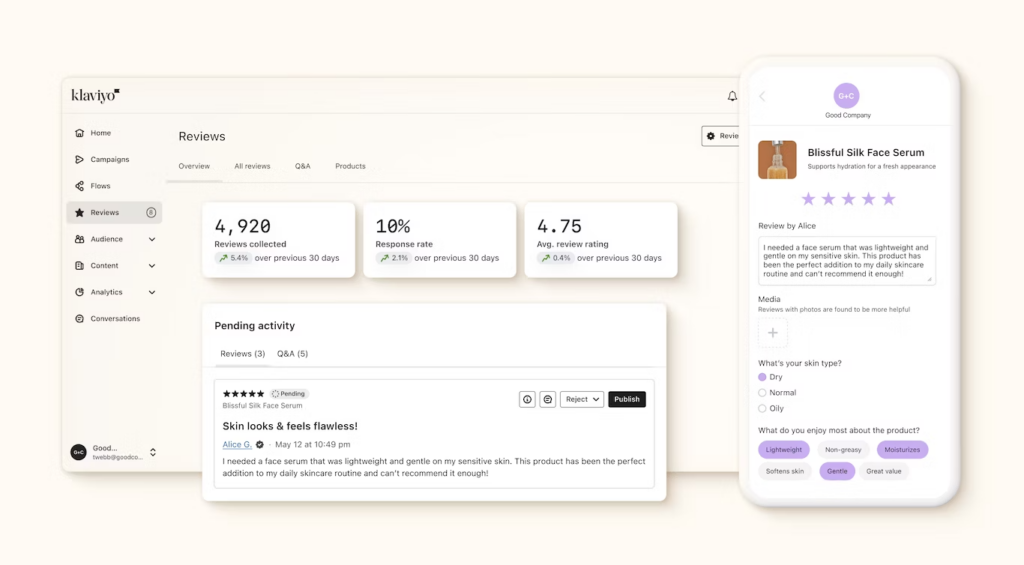
Data & Analytics
Brands also get access to a Reviews analytics dashboard, where they get insights into their reviews performance. This includes the number of reviews collected, review response rates, and their average review rating. Customers can also view their overall Klaviyo analytics dashboard to look at delivery metrics and reviews metrics. This allows them to build flows and segments based on customers’ order status and criteria.
Note: Delivery metrics are only available for customers on a paid plan.
Pricing Plans
Klaviyo Reviews is currently an add-on product, with its pricing structure as follows:
- $25/month, up to 250 monthly review requests
- $90/month, up to 1,000 monthly review requests
- $175/month, up to 2,000 monthly review requests
- $300/month, up to 3,500 monthly review requests
- $500/month, up to 10,000 monthly review requests
Customers can also get a custom plan by contacting Klaviyo’s sales team. They must be a Klaviyo Email customer to use Klaviyo Reviews, which ranges from $0/month with 0 to 250 customers to $1,955/month with 145,001 to 150,000 customers.
Pros and Cons
Klaviyo offers similar features compared to other reviews platforms, including custom questions, community Q&A, and coupon incentives. It also works seamlessly with Klaviyo’s other products, making it easy for existing Klaviyo customers to build reviews-related flows and segments. Lastly, Klaviyo has a dedicated tutorial, help center, and community forum to help brands optimize their reviews strategy. However, Klaviyo Reviews is a very new product and is therefore lacking in several key areas, including integration support, review syndication, and feature depth.
To start, it doesn’t have a native loyalty application, and combining Klaviyo with another loyalty platform is likely to result in significantly higher costs than solutions like Stamped’s Full Suite. As mentioned previously, since Klaviyo Reviews is a brand-new product, the onboarding process and support structure is currently unknown.
Klaviyo Reviews is only available for Shopify and Shopify Plus customers, excluding existing Klaviyo customers who use other ecommerce platforms like BigCommerce or WooCommerce. Klaviyo users also can’t get Klaviyo Reviews on its own, meaning they may end up paying for features they don’t plan to use. As mentioned previously, Klaviyo also doesn’t offer several major integrations that conflict with its Email, SMS, and Mobile Push products, including Hubspot and Attentive. This makes it difficult for brands looking to add Klaviyo Reviews to their existing tech stack.
Features-wise, Klaviyo does not offer review syndication outside of Google Shopping and does not offer any reviews-specific social push, meaning brands can’t share reviews across multiple websites, to major retail websites like Walmart and Target, or on social platforms like Facebook and Instagram. Next, there is no built-in NPS feature, which can be disadvantageous for brands looking to get deeper insights into customer sentiment.
Brands can’t collect site reviews, only product reviews, making it more difficult to gauge customer sentiment on things like shipping and customer service. They also can’t collect video reviews, only photos, limiting their range of user-generated content. Custom forms are limited to multiple-choice and range questions only, meaning brands can’t ask customers to write their own answers. There are only four widget types: star rating, review summary, review list, and carousel, with no options for a dedicated reviews landing page or additional widgets like side drawers and badges. It does not offer any options for displaying user-generated content in a dedicated visual gallery.
Lastly, while Klaviyo Reviews is designed to push customer data through flows and into segments to work with other Klaviyo solutions, it does not currently offer in-depth, reviews-specific insights. For example, while brands can see their review response rates and average review rating, they cannot easily identify top products by reviews or top keyword searches.
By comparison, Stamped offers a Full Suite solution where customers can leverage reviews and loyalty together at a reasonable rate. Stamped’s pricing plans are also highly flexible with both a monthly and yearly option, where annual plans come with a 20% discount. Finally, Stamped has dedicated onboarding and support teams to ensure business growth and success, including customer success managers who work with brands on a one-to-one basis.
Compared to Klaviyo, Stamped not only works with Shopify and Shopify Plus but with BigCommerce and WooCommerce, and can also be implemented on headless or custom/generic ecommerce platforms. Stamped users also get access to a wide variety of integrations they already know and use, including Bazaarvoice, Attentive, and Meta.
Stamped also offers review syndication made easy, helping brands distribute reviews across multiple websites, domains, locations, countries, and more. Stamped’s built-in NPS feature makes it easy for brands to measure customer happiness and optimize their marketing strategies based on actionable feedback.
Stamped users can collect both product and site reviews to get deeper insights into both customers’ opinions and shopping experiences, as well as collect both photos and videos to enrich their visual marketing. With Stamped, brands can also build dedicated landing pages and use a wide range of review widgets like side drawers and badges to help customers make a purchase decision no matter where they are on their website. They can also utilize features like smart social banners, shoppable Instagram galleries, and media albums to make the most of customers’ user-generated content and drive more sales and engagement.
Lastly, Stamped’s analytics dashboard provides in-depth, actionable insights to help brands better understand and serve their customers, including top customers and products by reviews, top keywords and searches, and more. Compared to Klaviyo’s basic analytics, StampedIQ is especially powerful for data-driven optimization, helping brands improve review accuracy and collect quality feedback.
Drive engagement and sales through your reviews strategy with Stamped
Reviews are important for helping customers build confidence in a brand and make a purchase decision, making them a key part of every brand’s acquisition and retention strategies. With reviews, brands can drive sales and engagement, enrich their marketing campaigns, and boost AOV and revenue.
With Stamped, brands can create and run an effective reviews strategy with fully customizable features, seamless integrations, a world-class support team, and actionable insights for accelerating business growth. Book a demo with one of our sales reps to learn more.
